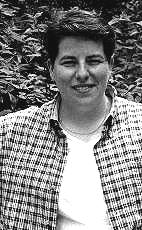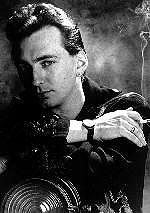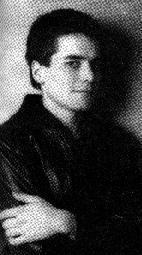
|
Diva Diaries
Sky Gilbert
& Buddies in Bad Times
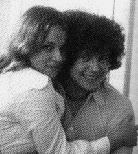
SKY NOT YET SPUN
Age 25, with Paula, his girfriend. Photo: Ejaculations
Let us return, for a moment, to Don Mills.
Sky Gilbert recalls his mother saying that "Don Mills rivalled New Rochelle, New York (where Dick Van Dyke and Mary Tyler Moore lived in the famous sitcom), as a clean, upwardly mobile middle-class suburb."
She had move from Buffalo (there six years, transferred from Connecticut by her husband's insurance company employer) with her kids Schuyler and Lydia and without Mr Gilbert. They had divorced. It was traumatic. They had, Sky writes, "lived an idyllic life in a Buffalo suburb. What had been a kind of Leave it to Beaver existence suddenly turned strange." She had thought Toronto, "a popular figure skating city," would be ideal for a fresh start. The family had done lots of it at the local curling club.
But "Stars on Ice" was not in Sky's stars. More telling had been his "organizing the neighbourhood kids into impromptu performances that I wrote," and a Grade Six essay: "The Autobiography of a Playwright."
-
"Perhaps I should say something at the outset about being an American in Canada. I'm still an American citizen. ... I talk like an American, walk like one, and think like one. If you've spent the first 12 years of your life in the USA, it's hard to leave your Americanness behind.
"The influence, in my case, is mainly cultural. I was brought up on American sitcoms. You might say that many Canadians are, too. The difference is this: Americans identify with their own cultural icons. Canadians, though they watch American TV, distance themselves from American stars and dare to judge them."
We seek distance from even Canadian stars, tall poppies stretching a bit too tall regularly cut down to size. Just ask Margaret Atwood. Or Carole Pope: "The lack of a Canadian star system is not just negative space: the Canadian media tend to denigrate artists after they achieve a certain level of success."
Or, ask Sky Gilbert.
Like Carole, Sky fled Don Mills -- if still, as he says, "a very good boy" -- for York University, then a job at The Book Cellar (my own first employer here, if at another branch). Then to another locale we've seen before.
-
"The whole thing really started in 1979. I remember the day very clearly. I was living in a rooming house on Huron Street, in 'The Annex' in downtown Toronto. I remember there were lots of youngish people living there.
[I had early Annex digs too, a flat shared youngish on Walmer Road.]
"And I remember just spinning around my room that day.
"I had just discovered Patti Smith. The song was 'Because the Night.' It went: 'Because the night belongs to lovers.' I was ecstatic because I had just decided that I was a homosexual."
"Well," Sky adds, "my special spinning day was a long time coming. You don't just spin around like the Wicked Witch of the West and melt into a homosexual. No, it was a torturous journey." Sky, on that spinning day, was 27 years old.
He had a girlfriend, Paula, a student in Radio / TV at Ryerson, Sky then at the University of Toronto Drama Centre. "We'd met when she was a candy girl and I an usher at the Uptown Cinema." They had fun, Sky loving "her beauty and cheer" but finding sex "a rather odious task. ... I was trying desperately to fulfill my duties as a heterosexual man without any real desire."
While at York Sky had done "small but ambitious" productions at the 519 Church Street Community Centre, and a few other venues. I recall my friend Joel telling me about a piece of his at the Central Library Theatre, likely Art / Rat, or MurderLover, both starring "intense, hauntingly beautiful, gawky" Mary Hawkins -- as punk poet Patti Smith.
"Sky," Joel said (who loved the name: he's Schuyler Gilbert Jr), "is one to keep an eye on. He'll go far." In 1976 at the U of T's Helen Gardiner Phelan Theatre, Sky produced a musical by Jacques Prévert, translated by Eric Bentley. One song's lyrics would turn out prophetic.
-
Buddies of mine in bad, bad times --
I'm on my way!
Box office receipts have been too small.
It's all my fault, yes, I'm completely in the wrong,
I should have listened to you all.
I should have played "The Handsome Poodle" --
that always goes down well.
But I followed my inclination
and later on
I got depressed
and sang the melancholy tale of
a miserable abandoned dog.
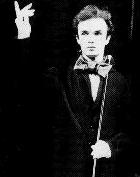
PALM PILOT
Ken MacDougall playing poet, here not Frank O'Hara but Radiguet; a shot Sky says Ken hated, from Ejaculations
In 1978, acting at the Factory Theatre in Games to Play While Waiting for the Revolution, Sky met actor / singer / dancer Ken MacDougall, "enormously funny and, compared to me, enormously relaxed."
Ken was friends with those a cappella divas, The Nylons. (I knew one casually: Claude Morrison. He showed up in, and a few times at, TBP as one of a crew doing a cable TV gig: This Show May be Offensive to Heterosexuals.) Ken later moved into their two-floor flat over a storefront on Spadina. Prominent among its fixtures was a loft bed over the dining room table.
Sky would soon move in too.
- "I thought I was being very naughty living there. There was a hole in the wall that one of the guys told me was caused by somebody fucking somebody too hard against it. The guys who lived there were always talking about 'the baths.' They were always running around in towels and talking about their sexual experiences very frankly, and, I thought at the time, crudely."
Sky thought for a time that he was in love with Ken. He decided it was more "in like" -- "basically we were sisters, not boyfriends." But he did persuade Ken to have sex with him. Once.
-
"-- a whole new thing, because when I first came out I had a terrible time persuading anyone to have sex with me! It was much against his better judgement and I don't think it proved anything at all except that I could finally say I had had sex with a man.
"I remember Ken was so small and thin it seemed I could hold his body in the palm of my hand."
I remember that too, if completely by chance and also just once. I don't recall how we met or when or where -- only where we went: to his highrise apartment on Broadview. I liked Ken, but we never connected again.
Ken would be among the founders of Sky's Buddies in Bad Times Theatre, its original mandate "to dramatize poetry on stage." He played Frank O'Hara -- "the undervalued gay beat poet," as Sky put it, whose work "had the innocence of Prévert" -- in Angels in Underwear and in a play named for one of Frank's most famous poems, Lana Turner Has Collapsed!
Frank O'Hara was my favourite poet. My only one, really. Joel had put me on to him in 1970, by then gone four years to a dune buggy in the dark on Fire Island. My brother Bill (he'd met Joel here on a visit) had sent me his massive Collected Poems, a gift on my 22nd birthday. Intimate with his work (once even with his lover of the late '50s, dancer Vincent Warren, by my time in Montreal), I'd never thought it -- and certainly not Frank -- "innocent."
I did see Ken in Lana, finding him as Frank, directed by Sky, too melodramatically maudlin for my proprietary liking.
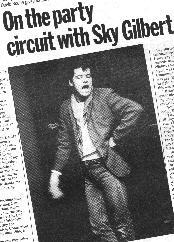
PARTY BOY
Sky makes a splash (bigger than he'd imagined -- & along with the famous February baths raids) in The Body Politic, Mar 1981. Photo: Burke Campbell
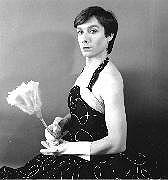
DIRT DEVIL
David Roche, in working drag for his performance piece Dirt is My Profession. Photo: David Rasmus © 1983
Sky's stay in the Nylon world of that Spadina walk-up allowed more than confirmation of his newfound desires ("I was homosexual. I had had sex with Ken!"). A party there one night would bring its public declaration.
-
"It was a great mix of people, gay and straight, all young and very arty. ... It was fun rushing upstairs and down to fill people's drinks, and waiting to see who would climb up into the loft and end up fooling around.
"But strange things came out of that party. Someone attended who would have an incredible impact on my life -- David Roche. Roche was a sparkling young fag about town and he also wrote for The Body Politic, Toronto's gay and lesbian liberation magazine."
"The Body Politic collective," Sky says of that moment, "was a closed shop to me. ... I envied David because he was right in the centre of the Body Politic group."
Well, if not quite a closed shop then a close one. David Roche was not on the collective but did live in one of the gay group houses that fostered it: 188 1/2 Seaton Street. Among others there in serial domesticity were Tim McCaskell, Richard Fung, George Smith, David Gibson, and David Mole -- all veteran gay activists. (In a performance piece, David Roche Talks to You About Love, it was one of them he talked about, a love unrequited, coming into the kitchen one morning looking stern. "You left your cocoa mug on the table last night.")
For a living David cleaned houses; as his vocation he turned life into art. In a fabulous '50s dinner gown -- wielding a duster and trailing a Hoover -- he gave us Dirt is My Profession, a brilliant monologue. "Cleaning paper lampshades? Take pieces of freshly baked bread and rub. ... Never use water on alabaster." He even had play with his employers.
- "You think you're something, don't you? You come in here, you pass a broom around a few minutes, put your feet up the rest of the time, and collect a cool $8.50 for every hour you're in the house. Well, it won't wash."
I'm quoting from The Body Politic, a review by Queen Street artist Andy Fabo (on the same spread one by another, Martha Fleming, of yet another: David Buchan as Lamonte del Monte: "Men like you like Semantic T-shirts!" -- from "Speedo" to "Adidas" to "Fetish"). That was the April 1981 issue. In the one just before, David Roche was the author, his subject: "On the party circuit with Sky Gilbert."
-
"He's buttonholed a photographer who shall capture the definitive Sky Gilbert at home, en deshabillé: 'Here's how I see the shot: me in the loft bed, dressed as Nero, while a hundred bare bottomed boys below shine flashlights on me.'
"The photographer gulps. Sky is clenching his fists like an impatient child, eyes screwed up tight in anticipation of the party. 'I hope there's an orgy. 'Cause I want it to happen!'"
Perhaps not direct quotes -- though David was fastidious. Even famously. Sky writes: "This article established, for me, a reputation that I've never quite been able to live up to." But he knew David meant well. And besides, as he said: "I found myself, at 28, suddenly being rocketed into the position of role model for the gay and lesbian community.
"The truth? I was almost as ignorant of that community as a straight person."
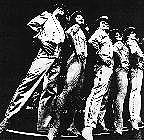

LONG LINES / BIG BUCKS
A Chorus Line: Stepping out forever: for $50 million net
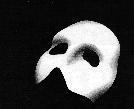
LE VRAIMENT MISERABLE
Phantom of the Pantages: for a decade
Sky marks 1979 not only for his own spin of fate, but for a turn in the fate of theatre. March 18, 1979, to be precise: the closing night of the Broadway show On the Twentieth Century, "one of the wittiest, 'singingest' musical comedies to be born from the hothouse of American musical theatre," he says -- and "a gigantic box office flop."
- "Why? Because by 1979 Andrew Lloyd Webber was developing the 'mega musical,' and Michael Bennett's A Chorus Line was already on its way to becoming one of the longest running plays in Broadway history. In 1979 the tide was changing ... intelligent lyrics, good books -- talent -- didn't matter anymore. Big bucks did."
A Chorus Line, opening in 1975 at New York's Shubert Theatre, would run for 6,187 performances to more than 1.6 million bums in seats, grossing nearly $150 million. And that was just New York. Touring productions would bring in nearly as much. In all, the show cleared $50,000,000 in pure profit.
During the '70s Toronto had seen a boom in alternative theatre, small companies in small spaces producing many Canadian works. But soon they were swamped -- by big bucks and the spectacle they afford: Cats, Miss Saigon, Les Misérables and, most miserably, The Phantom of the Opera. That Webberian monstrosity haunted the newly renovated Pantages Theatre for more than ten years.
All brought in tourists and their money, many meant jobs -- if rarely starring roles -- for struggling Canadian thespians. But they sucked the life out of local theatre.
- "Phantom never had critical success; it was always panned. But that didn't matter. With a publicity campaign of a million dollars a year, you don't even have to put on a play. People are saturated by the publicity, and many who never go to the theatre come out for the first -- and sometimes only -- time to see an event."
"Phantom audiences," Sky says, "are made up of old ladies, suburbanites, and gay men who have never been to the theatre, and may never go again. ... once you've witnessed a play where a chandelier almost falls on your head, then nothing but an IMAX roller coaster will satisfy you."
The commercial theatre, Sky says, is a "charm factory." The masters (he cites Wilde, Coward, and Joe Orton) marry charm with perceptive takes on the human condition. But most playwrights just want to keep the audience happy. "Everything else suffers for the sake of laughs."
For Sky, "everything else" was theatre as a prod, not a sop -- a challenge to all kinds of convention: theatrical (no proscenium stage); social (yes, these are gay plays); and, inevitably, political. Even confronting conventional "gay" politics.
- "...theatres in Toronto generally present gay plays only in the context of wider issues, set in different periods, or when saturated in 'family.' This trend climaxed with Angels In America, another lovely play (have I used the word 'lovely' enough yet?) that, they tell us, is not about homosexuality or homophobia or any of those nasty things. It's about the state of America."
A trend climaxing not just in theatre but fiction, "gay" fiction especially. Sky writes of novelist David Leavitt, saying he likes his writing, but:
-
"I found his political position disgusting. Leavitt's leading characters are always middle-class monogamous gay men, and they look with disgust and condescension upon drag queens, butch male clones, and S/M leather guys.
"The advent of AIDS had caused people like Leavitt to reject their lifestyle, and in fact had encouraged gay self-loathing. ... I refused to acquiesce and say: 'I've found love. I've found monogamy. I go to church every Sunday and my lover and I are going to adopt.'"

REVENGE FANTASY
A scene from Sky's own "Handsome Poodle" -- The Dressing Gown. Joe Norman Shaw & Allen Powell; photo: David Rasmus (courtesy of Buddies in Bad Times)
Sky had not always been protective of "drag queens, butch male clones, and S/M leather guys." And he was sometimes tempted to "charm" -- if in that oddly conventional way the media like to call "controversial." He did, indeed, do a "Handsome Poodle" -- if as "a miserable abandoned dog."
He looks back with mixed feelings on that time, and on his play marking it: The Dressing Gown, opened October 5, 1984 at Brunswick Avenue's Poor Alex Theatre (named in reflection of King Street's grand Royal Alexandra). The title named its key prop, perhaps even prime character: a robe passed from one man to the next, central player in a series of tricks.
- "Because homosexuality is despised by many in our culture, lots of gay men are closeted, or lie, or have sleazy anonymous sex. So a plot about men who hop from bed to bed, and lie about it, is particularly appropriate to our community. ...the play was a critique of gay life, a kind of revenge fantasy."
Sky was, he says, "fresh from my first hurts in love ... and fresh from being hurt by the gay community" -- who had avoided his Lacey and Radiguet, more difficult plays heavy with poetry.
His "revenge fantasy," though, took a surprising if not unusual form. As his friend and artistic angel, Shaw Festival director Christopher Newton, put it: "This is your big épater les bourgeoisie piece. You hit on something that middle-class types can really identify with."
The Dressing Gown was a hit. Jane Smith, herself in theatre, gave it an upbeat review in The Body Politic, noting "comic scenarios ... of opposing stereotypes," if also saying that "subtleties were almost lost in the humour." The humour was lost on me. If not the stereotypes, the "sad gay life" egregious cliché, worse for coming from a gay playwright. I hated The Dressing Gown -- "about the superficiality and destructiveness of promiscuity ... a very moralizing piece."
In time Sky did too. Those words quoted above are his own.
That renunciation was soon apparent. Sky calls Drag Queens on Trial, premiering October 1985, "a theatrical rebellion. Against The Dressing Gown.... Against everything else I identified as mainstream."
Its three queens (Doug Millar, Leonard Chow, and Kent Staines, as Judy, Marlene, and Lana Lust), cast as unknowns, became stars. Sky came to the premiere in drag. The play was, Sky says, "excessively melodramatic." Especially Lana's last speech.
-
"I want the audience to be overtly conscious of the manipulation of melodrama. They are meant to identify with [Lana's] plight but laugh at the theatrical conventions with which it is presented.
"On the other hand, the content of her speech is radical AIDS politics. Lana was saying, in 1985, at the beginning of the most intense period of AIDS hysteria, that AIDS should only be a physical illness and that sex should remain a sacrament, untouched by hate and prejudice."
Drag Queens on Trial became Sky's biggest hit. But, as he said: "No one seemed to 'get' either the critique of melodrama or the AIDS subject matter." Thus it would often be. Globe and Mail critic Ray Conlogue opened a 1988 review of Sky's first "drag musical," Lola Starr Builds Her Dream Home, with raves:
- "Do you want to know what theatre is like when it's in tune with its audience ... when electricity zipzaps between performers and viewers like domesticated lightning? You do? Then hustle down."
Then, just two paragraphs later: "There is only one caveat: if you're not gay you probably won't understand a thing."
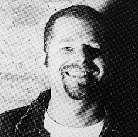
TRUE BUDDIES
|
Buddies in Bad Times, like a medieval Mattachine, led an itinerant life. After those library gigs and the 519 the Dream Factory, built as a Victorian brewery way east on Queen, saw early productions. (As on December 30, 1978 it saw The Body Politic's "Raid!" A bash for bucks to help cover legal costs rising from a real raid a year before, it featured Tony Malone and Glenn Schellenberg in performance, Carole Pope in attendance.)
Later they'd be buddied with four other companies -- Necessary Angel, Autumn Leaf, AKA Performance Art, and the feminist Nightwood Theatre -- at 666 King West. (A later tenant would whitewash its Satanic street number.) And there was the Poor Alex, home of another joint venture, the Theatre Centre.
In time, Sky writes, "Buddies had to seriously consider the problem of our nomadic existence." In 1990 both he and Tim Jones had noticed a place for rent on George Street, south off Queen East.
-
"'There's this space on George,' [Tim] said. 'I already mentioned it to you,' I said. Gee, already we were beginning to sound like a cranky old husband and wife. Well, it didn't matter who found the place first. We found it. It was perfect. It had a front office, ... a little lobby, a large theatre space with 13-foot ceilings and, finally, a perfect backstage area.
"Well, not perfect. There were no [public] washrooms. We decided to take it anyway because the rent was right."
Buddies lived on George Street for nearly four years. (Last I was by, the place was a car wash). Tim Jones was general manager -- not the first and inheriting, Sky says, "a company that was in bad shape. ... we were always, almost inexplicably, cash poor."
And often cranky. Tim Jones and Sky, he says, "didn't make a good pair; Tim short and silent, and me, the tall emotional storm." When they bickered, Gwen Bartleman would "just shake her head and say, 'Oh, you boys....'"
Sky had met Gwen at 666, young skinhead dyke friend of David Pond ("a very generous sweet punk kid ... very supportive of my work" -- and "a slut") and his boyfriend Dale Bolivar (you'll find Dale as my "protégé" at The Body Politic in a 1985 chapter of Promiscuous Affections). Gwen became Buddies' stage manager, "a very cool chick -- very good at her job, and not a man hater (just a woman lover.)"
Also on the scene was actor / writer / director Eddie Roy, graduate of the Dome theatre school in Montreal -- friends there with Peter Brawley and Steven Lack, who did gritty flicks with Bozo Moyle and Frank Vitale (Montreal Main and The Rubber Gun; see 1971 in my memoir). Sky had also met him at 666.
-
"Eddie Roy and I and David Pond started to have lots of fun together. We were all single [David and Dale split by then] and acting like sluts. ... When I had first met Eddie, I could only see his tough-boy butch beauty: he's about five foot nine with a hard, feisty little body and very sharp Italian features (his real last name is Chironi).
"I thought he was a street kid who happened to have an amazing sense of humour and explosive acting talent. But Eddie is much deeper than that, and he quickly grew up into a discerning fag who was attracted to beautiful young men himself."
For Buddies first six years, Sky had run it nearly alone. After The Dressing Gown it was no longer a one-man show. "I had mixed feeling about this," he writes. "It's true I had more time to think about artistic things. But I also had time to worry that I had less control," fearing "Buddies was literally 'getting away from me.'"
He says, finally, "I'm a bit of a control freak." That's the one line in Sky's memoir with which no one will likely take issue. Not a few have felt his lash (of tongue, anyway); he takes pains to acknowledge the battles, and their players. Of one he says: "Looking back on it, I see I was very cruel to him and I'd like to take this opportunity to apologize."
Buddies was Sky's creation. And his shelter -- a contradiction he understood well.
-
"How could it be me and at the same time my protection? ... My unconscious identification with Buddies caused me to want to expand it to include others who could support me (Buddies). But at the same time, I had paranoid fears that those very people might conspire against me (Buddies).
"Think of the expansion of Buddies as being a pill -- one you must take to prevent disease. You need it badly to protect yourself. But there may be side effects."
Whatever the side effects (and whoever suffered them), by the early '90s Sky's company was well more than Sky. Tim, Gwen, and Eddie were there, vital to it, protecting it and Sky too. They were true Buddies in Bad Times -- especially in times, coming soon, which the usual host of meanies would take from bad to worse.
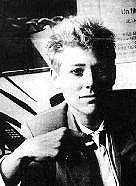
BEST BUDDY
Sue Golding, savior & pervert. Photo: Tony Fong, 1990
Another move, earlier on, had also shaped the fate of Buddies. In the early '80s, leaving the flat he had shared with his friend Patsy Lang, Sky moved to a big Victorian house at 57 Homewood Avenue. Like the Nylon loft on Spadina it was shared with friends -- and would, again, lead to revelations. The friends this time were Tim Guest, Bob Gallagher, and Sue Golding.
Tim had suggested the place to Sky. "Tim was no dummy," Sky writes. "He knew I was getting more than just flatmates. I was, quite literally, entering a new world, one that would change my life." As many lives have been changed by domestic digs defying "family" conventions.
Bob and Sue were teaching at Trent University, a commute away in Peterborough. Both also worked with The Body Politic, as Tim had. Sue was a force there -- as you can see in Promiscuous Affections, in particular the chapter called "Media: Beepers as 'journalists' -- not."
Bob once introduced Beepers to God: Michel Foucault, sometimes in town teaching. They'd had an affair -- "as much as anyone," Sky says, "could have a whole affair with the famously promiscuous philosopher." Foucault in Toronto cruised the tubs, and on Pride Day "got" gay lib at last as a force transcending theory: "It all made sense when I saw those asses swaying in the sun!"
- "Sue and Bob were more promiscuous than I was, although I hadn't thought that possible. And there was a relaxed, civil acceptance of overnight tricks and hangovers and dirty sex talk. Sex was just a part of life."
Sky had been frightened by Tim's first description of Sue: "She's a very political lesbian and she makes porn movies. Don't worry. ... She's great." "I knew that lesbians were political," Sky says, "and that's about all. I certainly didn't know that they made porn movies."
Sky had never met a dyke the likes of Sue. The few he did know, in Nightwood Theatre, "had something in common that I associated with lesbians -- they were very angry at men. Not just the patriarchy. Men."
It was Sue who'd give Sky his true education in feminist politics (of which, despite mainstream claims, there are many more brands than one). It was Sue who enabled him to use the term "man hater," which he said Gwen Bartleman was not, without typical "male" misogyny or the knee-jerk cringe of too many "male feminists."
- "Right off she started educating me. I was frank with her and told her that I was afraid of lesbians. 'Why?' she asked. 'Because I think they don't like men.' 'A lot of them don't,' she said. 'They're called essentialists. I'm not an essentialist.' 'What's that?' I asked."
"What I got from Sue," Sky says, "though I didn't know it at the time, was a crash course in the thinking of Michel Foucault" -- leading light of social construction theory. It posits that sex, even notions of "male" and "female," are not some timeless natural essence. They are shaped and seen in different ways at different times by many different societies. Shaped by language: the discourses of religion, science, psychiatry, the law.
Powerful discourses; discourses of power -- so pervasive as to seem "natural." And to deem sex, or much of it, "unnatural."
- "Early on in our friendship, Sue told me I was a pervert. I was a little offended. I said I'd always associated perverts with dark alleys. 'No, I mean, you like sex. Sex is one of the most important things in your life. That makes you a pervert. And that's okay."
Sky would later be told -- by a lesbian of somewhat different sexual politics and in circumstances relevant, as you'll see -- that "women don't like to have sex standing up." He told Sue. She said: "Tell her to fuck off. I just had sex in an alley -- standing up -- with some hooker last night!"
Sue would be just as blunt with dykes put off by pushy fags. In 1983 Sky asked her to join Buddies' board of directors. She became its president, a role she'd fill until 1995, even after she was off teaching in England, making brief visits back. Once she returned to news -- too familiar in times of "identity" politics rooted in resentment and complaint -- that some women at Buddies, led by playwright Audrey Butler, had formed a lesbian caucus.
-
"Sue was very concerned. 'A lesbian caucus? Why would they form a caucus?'
"'Well,' I said, 'very naïve to the way political groups work, 'they just wanted to form this group of happy lesbians, I guess.'
"'Happy lesbians? Are you kidding? Why did you let them form a caucus?' (She obviously hated the word.) 'You only form a caucus when you're dissatisfied -- when you have a beef. This is very bad. We can't have a lesbian caucus here at Buddies. That implies that the dykes are being oppressed by the fags.
"'I'm the president of this company, and that caucus makes me invisible! This is typical lefty politics. You form a caucus, and then you try and take over the group. I guarantee it. That's what's going to happen. We have to dismantle the group.'"
Sky says they didn't. But they did confront the caucus: when it tried to take over Strange Sisters, a Buddies project "that they got into their heads they had invented," men (and Sue) "suddenly not part of its history," and declare it for women only.
There had never been "women only" events at Buddies. Nor "men only," "black only," "queer only." No essentialist events. As Sky says: "We would do our best to create safe spaces for everyone without separating genders, races or sexualities. Sue was adamant about this." She was equally adamant with the dreaded caucus.
-
"Audrey started complaining about the fact that I got so much money for my productions. More than she got for hers. 'Why shouldn't I get as much for Black Friday as Sky gets for The Whore's Revenge?'
"'Because it's Sky's company,' said Sue. 'He started it. He works very hard for it. What have you done besides complain?'"
"I don't know what I would have done without Sue," Sky writes. "I'm easily intimidated, and if Sue had not been there I probably would have just given up and said, 'Go ahead Audrey, you run the company, I give up.' Sue was my savior at Buddies in Bad Times."
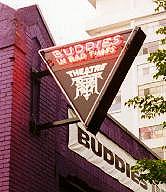
12 ALEXANDER
Buddies in "the ghetto" -- if sometimes too queer even for a "gay" nabe
Even as they were considering that space on George, Tim, Sue, and Sky had their eye on another: 12 Alexander Street, former longtime home of Toronto Workshop Productions. Founded in 1959 by George Luscombe, TWP had been a renowned pioneer of radical alternative theatre. "Popular theatre," as George put it.
-
"The term does not mean offering productions of a superficial appeal designed above all else to elate the theatre goer. It means bypassing existing audiences, going into areas where people are totally unconverted and thereby creating new awareness. In a century dominated by television and films, theatre constantly has to prove there is a need for it. Otherwise it becomes somewhat of an occasional outing and a cultural curiosity.
"Theatre is an essential industry, its own severest critic, a lifeline and an irritant. But, more importantly, it can be a visual conscience."
That mandate might well have been Buddies' -- if envisioned 20 years before Sky Gilbert gave it birth. And 12 Alexander, derelict since TWP closed its doors in 1988, would become Buddies' home. But getting there, and staying, meant no mere move. More an odyssey: epic battles, evil foes; retreats, advances, wars of propaganda; Buddies in some Very Bad Times.
The City of Toronto owned 12 Alexander. Council wanted to keep it a theatre and launched a competition for the space. Buddies put together a proposal with four other companies: DNA Theatre, Augusta, Platform Nine (Ken MacDougall with them then), and Native Earth Performing Arts.
The emphasis, Sky wrote: "would be on new works by experimental and radical artists. We pointed to the history of the old TWP and its political focus. We mentioned the political bent of all the companies involved." They wowed the jury.
- "We bowled them over. Particularly Sue. She was very impressive, very articulate. And whatever arguments they had against us she turned into arguments for us. Tim and I worked hard, but I have to give Sue the credit for making us one of the three companies picked for the final competition."
The others were Théâtre Français, and a coalition of independent producers headed by Chris Wooten of Vancouver. The winner: Wooten's commercial consortium. After all, Phantom was in town, apparent harbinger of the theatrical future. Buddies and its allied companies were seen as "unprofessional"; Théâtre Français, long established, likely as, well... French. A limited draw.
Wooten and his backers had won on a promise to renovate the space. Nothing happened. "The building just sat there, sagging and ghostly." By the fall of 1992 the consortium folded. "Tim was in there like a bat out of hell," Sky says, lobbying the City's 12 Alexander Street Selection Committee. Buddies finally got the building. They would also get $2 million in City funds, to finance renovations.
"Taxpayers' money." We know too well what that can mean.
In 1993, Buddies' Queerculture festival, launched a few years before, featured works by dykes not fond of caucuses but in love with cunts. Shannon Bell showed her video, Female Ejaculation Pyjama Party. An event "part play, part reality" was billed an "S/M Workshop." This was, Sky says, "a logical development of the feminist work at Buddies. These women were discovering their sexual power and wanted to express it."
Queerculture also featured Buddies' famous "Dungeon" parties, also born before.
-
"On the edges of the darkened room, we would set up risers close to the walls, so that the party space was ringed with alleys. And in these dark alleyways, people would sometimes have sex. Men, women, straight, gay. Whoever. Sue was very adamant about it. We were a sex-positive theatre and we should do nothing to stop sex at the parties.
"I can't stress enough how important these dungeon parties were for queer politics in the city. Nowhere else were dykes and fags partying and having sex in the same space. It made for the kind of unity between dykes and fags that was terribly important to Sue and me and our concept of the company."
It was at dungeon parties that Sky was told "women don't like to have sex standing up." It was a scold for not offering mattresses.
That spring, still at George Street, Sky took a call from a reporter he'd not (yet) heard of. Christina Blizzard had clearly got her hands on a brochure for Queerculture. "So what exactly are you doing having an S/M workshop?" she barked. "Is this where our government funds are going?" The conversation was heated, if brief.
-
"I slammed down the phone on her and said something like, 'Boy, was she a live one.' Tim and I didn't think much about it.
"The next day there was an article in the Toronto Sun that changed our lives. In it Blizzard launched an all-out attack on Buddies, stating that government funds were being used to finance perversion.
"She called Buddies a 'sex club' and quoted, completely out of context, the provocative titles of our events."
In fact, Queerculture wasn't specifically funded by grants. Buddies did get some, that project "a mere drop in the bucket" of its then $300,000 budget. And the Dungeon parties didn't cost anything: they were fundraisers. "If we were actually running sex clubs," Sky says, "we wouldn't need government funding. Sex clubs are lucrative."
But Blizzard wasn't interested in details. Sky writes: "She wasn't even interested in Buddies. She was interested in attacking government funding for the arts. And we were an easy scapegoat."
It had happened before: Tory MP Otto Jelinek rising in the House of Commons to ask why the taxpayers of Canada were footing the bill for something called Drag Queens on Trial. When word got around that it was "a critically acclaimed play," Jelinek backed off. "We weren't the sitting ducks he had assumed we were."
But now, if no sitting duck, Buddies was a target temptingly big: $2-million big, in city funds. "You could just hear them saying: 'Two million dollars? And they have those little sex parties? And people are starving?'" It was as if "this bunch of fags and dykes could get $2 million for anything."
Blizzard's rant was manna to the religious right, and to conservative city politicians eager to slap their arts council for that big Buddies grant. Seeking defenders, Sky found the arts councils, of Toronto, Ontario, and Canada on side, and firmly. Much more firmly than some gay folks downtown.
- "A lot of straight people assume that Buddies has always had the wholehearted support of the gay community. We haven't. Buddies was considered a fringe group: extreme and very sexual. Fags who hated drag hated me. Dykes who hated leather, porn, and men hated Sue."
Significant among wafflers in defence against right wing assault, Sky felt, were the Metropolitan Community Church and the city's major gay paper, Xtra. Why Sky would expect the Reverend Brent Hawkes to back Buddies (even if he could be found enjoying boys in strip clubs) is beyond me. He had gone on a hunger strike to force a government inquiry after the big February 1981 bath raids, but his flock was steeped in that "respectable" middle-class sanctimony Sky so abhorred.
He might have expected more from Xtra, offspring of The Body Politic, since deceased. But Xtra, he'd find, was not a patch on its radical parent.
-
"I confronted Eleanor Brown, the Xtra editor. I was angry because we so desperately needed their unequivocal support. We were a gay institution being attacked by the religious right. We expected Toronto's 'gay and lesbian biweekly' to rise on our behalf. 'Why can't you support us unequivocally?' I asked Eleanor.
"'What makes you think the gay and lesbian community support your theatre unequivocally?' Eleanor responded. ... 'My job as a journalist is to be objective.'"
Sky thought this was "pure evil," the goal of Xtra types "not to support gay liberation, but to make a career for themselves in mainstream journalism, so they have to make sure to appear 'objective.'"
He was right -- if maybe less about evil motives than purely "professional" ones. In Promiscuous Affections see, again, "Beepers as 'journalists' -- not." Then; Xtroids since, innocent of history, delude themselves that they are. Which was as editrix Brown would have it. Apparently her overseers too, if without the excuse of innocence: some of them were old enough to know better.
Later Eleanor's cub scribes would paw all over Buddies, diligently digging for "financial malfeasance." This while Xtra was being slowly bled of more than half a million bucks, embezzled by its own bookkeeper. Seems no one noticed. Or maybe someone failed to be fully "objective."

AMAZON WARRIOR
Jane: alter ego & constant Buddy. Photo: Ejaculations
An Amazon Warrior led Sky's troops in this epic struggle. Not Sue; she was away for much of it, in England. This protector was one who could never leave Sky's side: "Jane," born 1987, his drag alter ego.
-
"I remember going to a Halloween party dressed for the first time as 'Jane.' I ripped up an old leopard-skin bathrobe and appeared at the Masonic Temple dressed in scraps of fabric and not much else. I called myself 'Jane' because I was trying to look like Tarzan's partner. I went around all night asking cute guys if they were Tarzan.
"It was the first time I had ever tried to do glamorous drag. ...with my 'full figure' and height, I figured I'd have to dress up like a motherly matron -- which didn't appeal to me. But I'd made some discoveries around that time. ... I could actually look pretty glamorous with the right makeup! And I have great legs and a completely round and hairless butt. People were staring at me at this Halloween party -- with lust (which was neat).
"Anyway, drag freed me for a while. People didn't know Jane was Sky Gilbert. And boy, what great legs, and what a great ass!"
Jane was once stopped in a cab by cops apparently thinking she was a "transsexual, a drug addicted hooker; a chick with a dick." Searching her "person" they found no drugs, but gave her a ticket for not wearing a seatbelt.
Sky might have let it pass. Jane did not. "What if I were a hooker and I did go around in drag all the time? Would I have to put up with this type of harassment?" The case went to court during Queerculture 1990. Tim suggested they make it an event. Drag Queens on Trial, after all, had been based on a real court appearance, by Buddies' earlier manager Chris Bye -- for a parking ticket.
So it was not Sky who went to court, but Jane -- with a date, in a limo driven by Tim, sipping champagne and watching a porn video along the way. Some 50 fans applauded her at Old City Hall.
Jane was let off, on a technicality: it's not a crime to go without a seatbelt in a cab you've hired and don't own. The next day the Toronto Sun ran a photo, captioned: "Sky Gilbert, 6-foot, hairy-chested 220-pound drag queen, gets off!"
The Toronto Sun would have reason to notice Jane again -- during Christina's blizzard. It would be hard to ignore anyone of that description trying to pry open the glass lobby doors, locked, of the Sun's office on King Street East -- with a good crowd as backup. Staff stood inside aghast as cops held the door tight, "protecting the newspaper from a big scary... drag queen."
At Shopsy's deli on Spadina, famous for celebrity caricatures covering its walls, there would soon be one from Buddies. Not Sky. Jane.
If Xtra and the MCC dissed Buddies during this mess, "the avant garde theatre community and the leather fags and dykes came out in droves," picketting council meetings at municipal halls of power. Tim Jones had long been inside, flying again like a bat out of hell, lobbying.
It all paid off: the grant survived the storm. And so did Buddies.
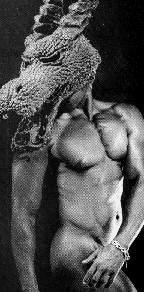
BARTHES BOY
Promo image for More Divine; photo David Hawe, souvenir program for the opening of 12 Alexander
Buddies opened 12 Alexander in October 1994 with Sky's More Divine: A Performance for Roland Barthes. Based on the philosopher's musings, with music by his contemporary Francis Poulenc, both gay, it was dedicated to "punk angel" David Pond, who had died in Vancouver in 1993, Gwen there with him.
Across the building's facade now blazed "Buddies in Bad Times Theatre" -- the biggest ongoing queer theatre venue in the world. And in the heart of Toronto's gay community. Its front space had been dubbed "Tallulah's Cabaret" -- licensed for booze, bar revenues in time a life saver. It would become famous for "Wet Spot" dyke nights and "Sissy Saturdays."
A few actors from other companies performing in the vast black box of the theatre's main space, "The Chamber," would avoid even a glance into Tallulah's as they scooted to the exit. "The rumour was," Sky said, "that our bar had become a 'gay' bar. And that that was a bad thing."
It had. And it was a great thing. If not without its ironies.
Up on its mezzanine a display celebrates the legacy of Buddies' forebear, Toronto Workshop Productions. Its guiding light George Luscombe had said "Popular Theatre" must mean "bypassing existing audiences, going into areas where people are totally unconverted and thereby creating new awareness."
Many of the happy homos who partied at Tallulah's would never set foot in The Chamber. Some, Sky suspects, didn't even know they were dancing in a theatre. A queer theatre, in their own nabe. But it would have trouble "creating new awareness" -- true queer awareness.
That existing audience had already been converted. Not to Queer -- with its vast and promiscuous liberatory potential.
No. To that more limited, sober, even "respectable" orthodoxy: "Gay."
Next: What's a diva to do?
Go back to Diva Diaries / Contents page
Or to My home page
Go to Promiscuous Affections / Introduction
Or to specific chapters noted above:
1970 -- for Frank O'Hara
1971 -- for Montreal Main & The Rubber Gun
1973 -- for Vincent Warren
1985, Part 1 -- for Dale Bolivar
Media: Beepers as 'journalists -- not -- for Sue Golding, Buddies, & Xtra
Media: Journalistic "ethics" vs real ones &
Citizenship: In the world & at work -- for more on Xtra
This page: http://www.rbebout.com/divas/dsky.htm
January 2001 / Last revised: June 1, 2003
Rick Bébout © 2001-2003 / rick@rbebout.com
